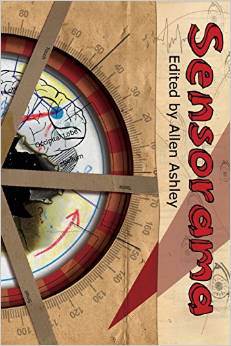 Edited By ALLEN ASHLEY (Eibonvale Press; 2015)
Edited By ALLEN ASHLEY (Eibonvale Press; 2015)
This terrifically oft-kilter anthology of bizarre fiction is based on the five senses and our relationship to them. The opener is “Blinding A Few Dogs” by Gary Budgen, whose sense of choice is sight—specifically that of a man with macular degeneration that causes a tear shape to obstruct his vision. In its strangeness and unpredictability—it’s an eccentric love story in addition to a psychedelic mind-roaster—“Blinding a Few Dogs” adequately sets the tone for the remaining twenty stories.
There’s “The War Artist,” a highly elliptical reverie by Tim Nickels about the tortured emotional life of a man who, we gradually learn, is invisible. Invisibility is also the subject of Mark Patrick Lynch’s “Making See,” whose narrator has to deal with his girlfriend turning see-through, apparently a side effect of a “rare virus.” It’s less elliptical than the previous tale, but no less bizarre, with everything the girl touches turning opaque and the narrator finding a “strange eroticism” in her condition.
“Stain” by Ian Hunter, involving a man with an irresistible compulsion to lick a mysterious stain on his bathroom ceiling, is a story that starts out in somewhat comedic fashion but turns VERY dark. Of a similar hue is “Little Fingers” by Christine Morgan, about a woman who feels tiny fingers jabbing and kneading her body inside and out; the source of those fingers provides one of the book’s most unexpected surprises.
An especially memorable entry is “Graft” by Adam Craig, concerning the process of regrowing one’s skin, an uncomfortable sensation that’s apparently “like being wrapped from neck to toe in coarse wool, each strand flexing.” I also appreciated Douglas Thompson’s “Musk,” whose narrator develops an unnaturally acute sense of smell, a “talent” he puts to good use after civilization is wiped out by an unexplained catastrophe.
“The Impression of Craig Shee” by David McGroarty focuses on a glimpse of unearthly radiance sighted by a woman visiting the Scottish land where her mother once lived. “Maneater” by David Gullen is notable for its gender-neutral protagonists, identified as “em” or “ey,” who are hunting sensory-impaired “Onca” men on a distant planet. As for the completely outrageous “Bang, Bang, Thud” by Ralph Robert Moore, it takes into account all of the senses in its warped tale of a working stiff and his struggles with a perverted window washer(!).
There’s also “Space” by Terry Grimwood, which imagines a LOGAN’S RUN-ish future world in which a man is ousted from the tightly regulated indoor universe where he’s lived his entire life into the more forbidding outer region. It is perhaps the most conventional of SENSORAMA’S tales, but no less effective for that.
Also included is a fun authors’ bio section in which the “Sensationalists” sum up their lives in 21 words or less (Michael Patrick Lynch, for instance, “isn’t sure why he writes. Is scared of stopping, though”) and list their favorite sense (M.P. Lynch again: “He tells people his favorite sense is good sense, but anyone who knows him will tell you he hasn’t any of that”).
